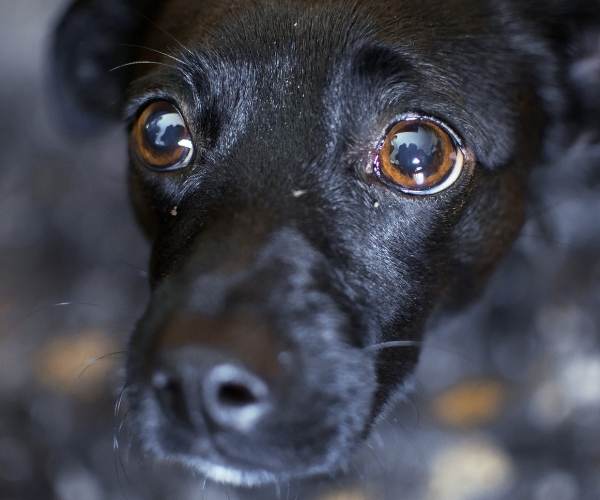Are you struggling with your dog taking a long time to pee at night? If you are spending (what seems like forever) outside waiting for your dog to pee, only to be met with sniffing and distractions, you’re not alone.
I think every dog parent has dealt with this. It can be very frustrating and exhausting especially during cold or bad weather or when you have to wake up early to go to work the next day.
I know, I myself had the same question as you… Why is my dog taking so long to pee at night?!?
The top reasons why your puppy might be taking forever to go pee at night is that your dog may be distracted, stressed or anxious.
Today I’m going to share with you the most common reasons for this frustrating behavior and give you practical solutions to help you help your dog pee faster at night.
So let’s dive in and get you and your puppy sleeping soundly through the night!
Your Puppy Might Be Distracted
The number one reason that may be contributing to your puppy’s nighttime bathroom delays is distractions.
Puppies are naturally curious, and the sights and smells of the outdoors can be overwhelming to their sensitive noses.
They may be more interested in exploring their surroundings, playing with a nearby stick or leaf, or eating grass instead of taking care of business.

The Solution for a Distracted Puppy
Take your puppy out on a leash to limit their ability to become distracted and keep them focused on the task at hand.
Take them to a designated potty area and give them a potty command.
If your puppy tries to eat grass or play with sticks or leaves, tell him to leave it and if he doesn’t give him a little tug away from the distraction while saying leave it. When he leaves it, mark it with a yes!
When your puppy goes potty, mark it with a yes, praise him and take him straight back into the house to bed.
Distraction is not the only potential culprit.
Stress and Anxiety Can Affect Your Puppy’s Bladder
If your puppy seems hesitant to pee at night, stress and anxiety could be to blame. Just like humans, dogs can experience stress and anxiety for a variety of reasons.
Stress and anxiety can also affect your puppy’s bladder, making it harder for them to go when they need to. Your puppy may be afraid of the dark and all the new nighttime noises.
Your pup may be nervous about being alone in the dark, or they’re unsettled by unfamiliar sounds or smells outside.
The weather can also cause stress and anxiety in your puppy during nighttime potty breaks. Some puppies may be unsure of or even scared of rain or snow. In these cases, your puppy may not even want to go outside at all.

Whatever the cause, anxiety can lead to bladder problems and make it difficult for your puppy to relax enough to go potty.
The Solution for a Stressed or Anxious Puppy
Here are a couple steps you can take to help your puppy feel more calm and relaxed…
- Add lights in your dog’s designated potty area.
- Keep your dog on a leash and stand where your dog can see you.
- Praise your dog and give them a treat when going out in the rain or snow. This will help them have associations with rain and snow helping them overcome their fear or dislike.
RELATED===> 6 Pro Tips to Help Your Puppy Pee Quickly at Night: Good-bye Bags!
Your Puppy Might Be Suffering from a Medical Condition
If you’ve tried helping your dog through their stress or anxiety or have limited their distractions and your puppy is still taking a long time to pee, it’s possible that they could be suffering from a medical condition.
In some cases, urinary tract infections or bladder issues can cause puppies to have difficulty urinating or they may even experience pain while peeing.
If you notice any signs of discomfort or unusual behavior during bathroom breaks, take your puppy to the vet for a checkup. As I always say, better safe than sorry.
The good news is that many medical conditions that affect a puppy’s ability to pee can be treated or managed. With that said, it’s important to catch these issues early before they worsen or lead to more severe health problems.
Train Your Puppy to Pee on Command
Another effective solution for managing your puppy’s nighttime potty habits is to train them to pee on command.
This means teaching your pup to associate a specific word or phrase with the act of peeing or pooping. By doing so, you can train them to go potty on command and make those nighttime bathroom breaks much shorter and less stressful.
To train your puppy to pee on command, start by choosing a specific phrase like “go potty” or “do your business.” Whenever you take your pup outside to go potty, use this phrase consistently and repetitively to reinforce the association between the phrase and the behavior.
You can even train your dog to pee or poop on command. Here’s a full breakdown of how to train your dog to potty on command.

It’s important to reward your puppy immediately after they finish peeing on command, so bring some treats with you when you go outside. This positive reinforcement will encourage them to repeat the behavior the next time you use the command.
Training your puppy to pee on command will make the process faster and less stressful for both you and your fur baby.
RELATED===> Puppy Potty Training at Night: The Secrets to a Quick and Hassle-Free Experience!
Conclusion
A dog’s slow peeing at night could be due to distractions, stress/anxiety, medical conditions, or lack of training.
By understanding and addressing these causes, you can help your dog overcome this problem and help them and you get back to sleep faster!
Remember, it’s important to seek professional help if your pup’s nighttime potty problems persist even after trying different strategies to overcome it.
If you have any questions or comments leave them below. If you found this post helpful, let me know or give it a share!

